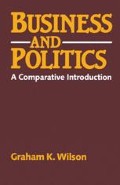Abstract
Britain has been labelled a capitalist, socialist and corporatist political system. These contradictory labels used by different writers sometimes reveal more about the attitudes of the writers than they do about Britain. However, the fact that Britain can be described in such varying ways does highlight an important fact about the country. Different tendencies do exist in Britain which can, for example, tilt policy-making in a more or less corporatist direction as governments consult more or less closely with economic groups. A temporary strengthening of a trend can lead, perhaps too easily, to articles in the press proclaiming that Britain is now, for example, a corporatist country. However, one of the features of the business—government relationship in Britain is, indeed, its flexibility. As we shall see, the degree to which government consults with the organisations representing business or labour in general varies considerably, as does the extent to which governments attempt to plan the economy.
Preview
Unable to display preview. Download preview PDF.
Notes and References
Richard Rose, ‘Two and One Half Cheers for Capitalism’, Public Opinion, 6, no. 3 (Jun–July 1983) pp. 10–15.
For comparison between the advanced industrialised democracies in these respects, see Anthony King, ‘Ideas, Institutions and the Policies of Governments’, British Journal of Political Science, 3 (July 1973) pp. 291–313.
This conclusion was reached by a comparison of productivity in car factories conducted by the Central Policy Review staff. The study is criticised in Karel Williams, John Williams and Denis Thomas, Why Are the British Bad at Manufacturing? (London: Routledge & Kegan Paul, 1983), who argue that British wages are so low that poor productivity does not matter; British workers are paid less for producing less. This is scarcely comforting.
Perhaps the most interesting attempt to explain this is Martin Wiener’s English Culture and the Decline of the Industrial Spirit, 1850–1980 (Cambridge, Mass.: Cambridge University Press, 1981).
Michael Moran, The Politics of Industrial Relations (London: Macmillan, 1977).
Michael Pinto-Duchinsky, ‘Financing the British Election of 1979’, in A. Ranney (ed.), Britain at the Polls (Washington, DC: American Enterprise Institute, 1979).
The major work on the CBI is Wyn Grant and David Marsh, The Confederation of British Industries (London: Hodder & Stoughton, 1977).
See also Marsh in David Marsh (ed.), Pressure Politics, Interest Groups in Britain (London: Junction Books, 1983).
Frank Longstreth, ‘The City, Industry and the State’, in Colin Crouch (ed.), State and Economy in Contemporary Capitalism (London: Croom Helm, 1979); D. Marsh and G. Locksley, ‘Capital, the Neglected Face of Power?’, in Marsh (ed.), Pressure Politics, pp. 21–52.
Michael Moran, ‘Finance Capital and Pressure Group Politics in Britain’, British Journal of Political Science, 11, part 4 (October 1981) pp. 381–404.
Committee to Review the Functioning of Financial Institutions (Sir Harold Wilson, Chairman) Report (London: HMSO, 1980, Cmnd 7937).
Commission of Enquiry into Industrial and Commercial Representation (Lord Devlin, Chairman) Report (London: Association of British Chambers of Commerce/Confederation of British Industries, 1972).
Raymond Bauer, Ithiel de Sola Pool and Lewis Anthony Dexter, American Business and Public Policy (Chicago: Aldine, 1972).
For a vigorous attack on this process, see S. E. Finer, Adversary Politics and Electoral Reform (London: Anthony Wigram, 1975).
On this, see Douglas Ashford, Policy and Politics in Britain, The Limits of Consensus (Oxford: Basil Blackwell, 1981).
Copyright information
© 1985 Graham K. Wilson
About this chapter
Cite this chapter
Wilson, G.K. (1985). Business and Politics in Britain. In: Business and Politics. Palgrave, London. https://doi.org/10.1007/978-1-349-17936-7_4
Download citation
DOI: https://doi.org/10.1007/978-1-349-17936-7_4
Publisher Name: Palgrave, London
Print ISBN: 978-0-333-34092-9
Online ISBN: 978-1-349-17936-7
eBook Packages: Palgrave Business & Management CollectionBusiness and Management (R0)

